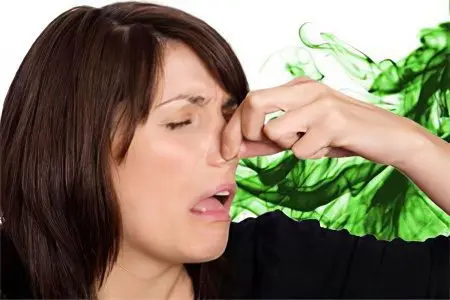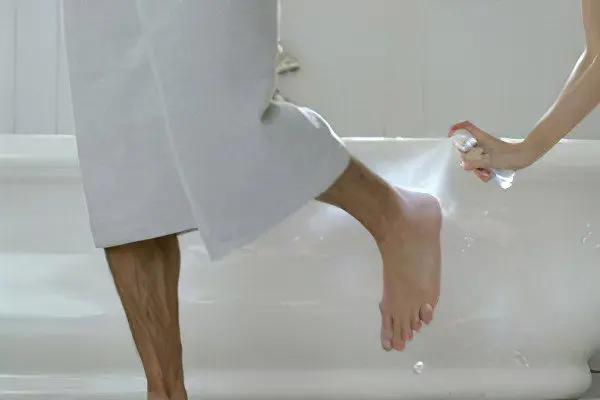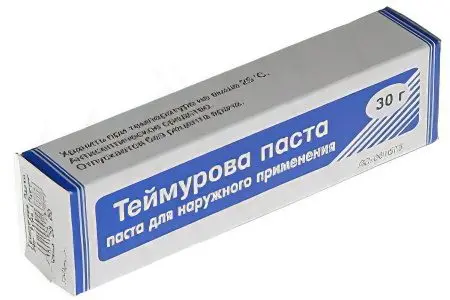Contents
Modern man has long been alien to constant irritation with various bodily odors. Thanks to hygiene and the development of the perfume industry, any healthy person can choose the aromas coming from him. But in some cases, defeating nature is not so easy.
The unpleasant smell emanating from the feet can spoil the mood of even the most cheerful person. The worst thing is when this smell is felt even with shoes on – which means that the issue must be resolved as soon as possible. Usually, the problem of unpleasant foot odor is left to chance, and this can lead to unforeseen consequences and complications, not to mention the banal discomfort that occurs every day.
Why does foot odor occur?
Natural causes

The primary environment necessary for the appearance of an unpleasant foot odor is the sweat secreted by the glands of the skin of the feet. There are quite a lot of sweat glands on the legs, therefore, when overheating occurs due to physical exertion, wearing warm shoes, heat, poor-quality material of socks and boots, the secretion increases to 200 g per day.
By itself, sweat has a rather subtle odor that is not easily recognizable. Sweat is almost entirely water, and salts, ammonia, and acids that are excreted through the sweat glands make up only 1% of the total weight of the secretions, so they cannot be the cause of foot odor.
As studies have shown, a truly unpleasant smell from the feet becomes due to the reproduction and vital activity of bacteria, for which a warm and humid microclimate in shoes is simply ideal. As a result, bad-smelling metabolites and the bacteria themselves, mixed with sweat, remain in the shoe fabric, and even daily washing of socks does not help get rid of them.
Of course, microorganisms are not always to blame – sometimes sweating and a strong smell of sweat are individual traits of a particular person. In this case, close people usually know about this feature themselves, so that only strict hygiene is required from the patient, and the problem will be solved.
Pathological causes
Unfortunately, not only opportunistic bacteria have chosen the feet as a habitat.
Other parasitic organisms can also provoke an unpleasant odor:
Nail fungus;
Foot fungus.
In addition, systemic diseases can negatively affect the composition of sweat and worsen foot odor:
Diabetes
Tuberculosis
Hormonal restructuring;
VSD (vegetative-vascular dystonia);
Diseases of the cardiovascular system;
Diseases of the nervous system, as well as stress and fears;
Improper nutrition, affecting the state of the gastrointestinal tract, liver and kidneys.
If the smell at the feet appeared for no apparent reason, when it was not there before, you should consult a doctor for a comprehensive physical examination.
The provoking factors
In addition to the causes of an unpleasant odor from the feet, everyone should know what exactly contributes to the development of both natural and pathological odors:
The unpleasant smell in any case becomes stronger if:
The rules of personal hygiene are not observed: regular bathing, washing things, etc.;
Foot wear (tights, socks) or shoes made of synthetic materials;
There is not a sufficiently frequent change of clothes for the legs;
Feet are permanently locked in closed shoes;
Wearing wet shoes and socks.
If all of the above factors are excluded, but the smell still remains, you can try using creams or special deodorants – with the natural origin of the smell, this most often helps. An unpleasant odor of pathological origin can be eliminated only by curing the corresponding disease.
Unpleasant foot odor due to fungal diseases

The problem of foot or toenail fungus is far from familiar to everyone, since in most cases infection does not occur due to the immune response. The disease occurs only under the condition of a weakened immune response, and then the fungus spreads quickly enough that the fight against it takes a very long time. So how to get rid of the unpleasant smell of the feet in the presence of fungal diseases?
The following medications can be prescribed by a doctor against a fungus:
Ketoconazole, Fluconazole, Itraconazole – tablets for internal use;
Nizoral, Zalain – creams for external use;
Lamisil, Terbiks – sprays with antifungal effect;
Demicten, Lotseril, Batrafen – varnishes against nail fungus.
In the fight against fungi, it is necessary to strictly adhere to the rules of hygiene of the skin on the legs, as well as instructions for the use of antifungal pharmaceuticals. Regular disinfection of shoes will also help to get rid of the unpleasant smell.
Personal hygiene rules
These rules are quite simple, but if the patient admits weakness and does not follow at least a few of them, no means will help get rid of the unpleasant smell of the feet. In some cases, even one implementation of hygiene rules is enough to eliminate this smell.
Wash your feet three times a day with a cleanser (soap or shower gel).
If health permits – after each wash you need to pour cold water over your feet.
It is necessary to regularly eliminate the stratum corneum of cells in which fungi and bacteria live. For this, scrubs, peelings with fruit acids, etc. are used.
After bathing, the feet are thoroughly dried, especially between the toes.
Tights and socks should be made of breathable natural materials, in extreme cases – with a small admixture of synthetics. They should be changed daily.
Footwear must meet the highest requirements for the quality of materials, as well as be proportionate.
Once a week, shoes are treated from the inside with a solution of hydrogen peroxide or potassium permanganate.
Foot deodorants

In order to get rid of the unpleasant smell of the feet as a symptom, until its root cause is eliminated, deodorants are used. They are convenient and affordable means of daily use.
Deodorants are distinguished by type: cream, spray, gel or talc, as well as by the mechanism of action:
Antiperspirants – they simply block the pores through which the secret of the sweat glands is excreted. For some, they are not suitable, since with prolonged use they can cause stagnation of the discharge. Example: FreshFoot, Klima Surefoot Spray, Odor Control Neutra-Active.
Normalizing perspiration – are able to keep the amount of sweat emitted at the minimum allowable level necessary for the body to function normally. Example: Deo control, Vishy 7 days.
Treatment – have an antiseptic effect, which helps to temporarily get rid of the smell provoked by bacteria. Example: Gewol honey.
Creams, lotions for feet
In order to eliminate excessive sweating, foot creams are also used. They are suitable for permanent use, it is only important to choose the ideal tool. In addition to preventing sweating, the cream helps to soften and nourish the skin.
Among the popular foot creams, the best are:
Dry-Dry from Scandi Line – a clear lotion with aluminum chloride hydrate and denatured alcohol. Thanks to active substances, a protein-aluminum plug is formed on the sweat tubules. The blocked sweat is secreted through the free glands located above the legs and is excreted by the kidneys. The tool is able to prevent excessive sweating for 5 days.
How to use: gently apply to dry and clean skin of the legs one hour before bedtime. Massage a little, then wait a couple of minutes until the lotion dries. After applying the cream, it is not recommended to carry out any bathing procedures so as not to wash off the preparation.
Lavilin from Hlavin is produced in Israel, replete with natural ingredients: calendula, chamomile, mountain arnica, potato starch and talc. Thanks to them, the cream destroys fungi and bacteria, binds excess fluid. Zinc oxide, ethylhexylglycerin and triethyl citrate slow down the release of sweat.
How to use: rub evenly into the skin on problem areas, then do not allow the product to get wet for about 15 minutes. If the unpleasant smell appears again, it is possible to reapply the cream.
“5 days” from Galino Pharm contains zinc oxide, acetyl alcohol, camphor and menthol. This ensures a complex effect: menthol refreshes and creates a feeling of coolness, camphor disinfects the skin, alcohol retains moisture, and zinc oxide dries and binds unpleasant odor molecules.
How to use: every day, preferably before going to bed, apply a small amount of cream on clean and dry skin so that the product is completely absorbed into the skin without leaving a greasy film.
Part-control differs from Kalina in a special oil vitamin complex OilCare. The complex includes cocoa butter, lavender and shea butter, as well as tea tree extract, retinol, tocopherol and nicotinic acid. The protective film formed by these substances prevents sweat odor and inhibits the growth of bacteria.
How to use: rub into the skin between the toes and over the entire surface of the feet after a shower. After each bath or when an unpleasant odor is detected, reapplication is required.
Foot cream from the Green Pharmacy has antifungal and deodorizing properties. A prolonged five-day effect is provided by tea tree oil, menthol, camphor and zinc oxide.
How to use: cover the skin of the feet with a small amount of cream and wait until the product is completely absorbed. The tool becomes more effective when used after steaming the skin in a bath, bath or sauna.
How to get rid of unpleasant foot odor with pharmaceutical products?

Benzoyl peroxide gel or lotion 5 and 10% also popular under the trade names Oxy Silver, Baziron AS. The drug was developed to combat acne, but the practice of using it for unpleasant foot odor is widely known. The action is due to the content of benzoyl peroxide, which stops the reproduction of anaerobic bacteria and fungi. The course of continuous use should not exceed 3 months.
Pasta Teymurova – a special remedy for excessive sweating. Dries and disinfects the skin with salicylic and boric acids, talc and zinc oxide. It is rubbed at night between the fingers and into the skin of the feet with massage movements for two to three minutes. The period of continuous use is 3-4 days, between which a break of 2-3 days is necessary.
Lavender oil added to the foot bath as an emollient, disinfectant and tonic. For better dissolution in water, 5 ml of oil is pre-mixed in milk. The foot bath procedure at room temperature of the solution lasts no more than 20 minutes.
Formidron – formaldehyde is used as an active ingredient. It is used once a day by rubbing into problem areas – the easiest way to do this is with a cotton swab, since the product is available as a solution. Always use with caution – the drug can provoke overdrying of the skin.
Alum burnt – powder from natural potassium-aluminum alum. Alum is a unique substance that can adsorb excess sweat and immobilize opportunistic and pathogenic microorganisms. The powder is used on clean skin in the morning, the rest of the powder is washed off when bathing in the evening.
Boric acid – eliminates unpleasant odors due to antiseptic properties. It is applied by falling asleep in socks. In the morning, linen with boric acid distributed over the surface is put on clean feet, and in the evening it is sent to the wash. The mode of use of the drug is daily for a week, then a week break.









